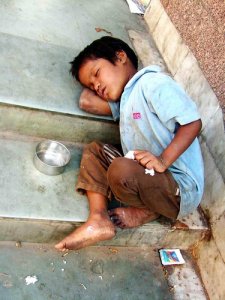Is there a link between Poverty and Poor Health?

By: Santosh Kumar GM
KGW News (2018) interviewed Dr. Franklin, who touched upon the wage gap playing a major factor in accessibility. People in poverty are faced with the inability to find transportation to clinics and hospitals. Individuals who are placed in a lower wage class are presented with less resources one of which being healthcare. This places them at a disadvantage of acquiring a clean bill of health.
Poverty Outcomes
living in poverty may lead to many difficult outcomes. Being in Poverty could result in poor health and incurable diseases. Individuals who are poor have less access to healthcare and are exposed to environmental hazards which decreases the economic growth rate. Families living in poverty are more likely to use tobacco, alcohol, eat low nutritional value foods, and live-in urban areas close to the highway with high levels of pollution. The economic growth is highly affected by poverty and high crime rates. Your socioeconomic status or wage class plays a major factor in the decrease of your health. (GAO2007)
Health Equity
The life expectancy of a person is based on their income. Income has become the revelation on who lives and dies. Income inequality has resulted in the middle and poor class becoming much sicker than the upper class. The article “Income inequality: When wealth determines health” by Kim Krisberg (2016), he reported that their was a correlation between children in poverty and chronic diseases. This study was able to shed light on low-income families struggling to receive proper medical care for their children.
Socioeconomic Discrimination
Human right principles need to be implemented and delivered to focus on the healthcare needs of the homelessness, poverty, and citizens with poor health. Discrimination does occur when a big determinant is most often the socioeconomic status of the citizen. Every citizen should be treated equally and with dignity. The lack of income makes it extremely difficult for families and individuals to sustain a functional livelihood. Ill health is the common outcome when faced with financial burdens. The poor and homeless are very vulnerable to illness leaving them the most at risk for socioeconomic discrimination. (Krisberg2016)
https://www.health.org.uk/infographic/poverty-and-health
Poor Diet within Poverty
There is a significant difference between the life expediencies of poor families compared to families with higher incomes. Families living in lower poverty have higher rates of chronic illnesses, for example; diabetes, high blood pressure, and elevated cholesterol levels. Some of the chronic illnesses that the poor communities face are based upon their eating habits. Eating unhealthy is more affordable for low income families. Fruits and vegetables are more expensive than unhealthy foods that are sold. “One study showed that individuals with low incomes had life expediencies 25 percent lower than those with higher incomes” (GAO, 2007).
Some families have only 5 dollars, they have 2 options on how to spend that money wisely. Either use it for food or to buy prescriptions. This study goes on to explain how various prescriptions are not affordable for people in poverty. The medication their not able to access due to finances is detrimental to the health of these individuals. The inability to purchase medication places people in poverty at severe health risks due to sicknesses and diseases going untreated.
What is this Blog saying ?
This blog validates the claims that poverty is directly related too poor health. The articles, and media clips reinforces the theory of poverty directly linking too poor health. To conclude main stream media correlates with TV, News articles , and blogs making it alright to trust the information on this topic.
Poverty in America: Economic Research Shows Adverse Impacts on Health Status and OtherSocial Conditions as well as the Economic Growth Rate: GAO-07-344. (2007). GAO Reports,
Krisberg, K. (2016, October). Income inequality: When wealth determines health. Nation’s Health, 46(8), 1–17.
Lynch, P. (2005). Homelessness, Poverty and Discrimination: Improving public health by
Realising Human Rights. Deakin Law Review, 10(1), 233–259.
Smith, K. E., & Anderson, R. (2018). Understanding lay perspectives on socioeconomic health inequalities in Britain: a meta‐ethnography. Sociology of Health and Illness, 40(1), 146–170
Study reveals poor health links to poverty – youtube. (n.d.). Retrieved November 18, 2021, from https://www.youtube.com/watch?v=1xm_ODUXNks.
Youtu.be. Poverty USA – healthcare – Nov 15 2007. (n.d.). Retrieved November 18, 2021, from https://www.youtube.com/watch?v=jUV66P5Lr6Q.
How poverty can affect health – youtube. (n.d.). Retrieved November 18, 2021, from https://www.youtube.com/watch?v=_kS1oy64EiM.

Thank you for bringing light to this topic. It is very sad that everyone is unable to receive the same level of care. As you mentioned above, healthy foods are more expensive than unhealthy food. I would imagine it comes down to having enough food to survive instead of worrying about the quality of the food. Most people are taught to take care of immediate problems and worry about the rest later. So, it makes sense that someone who is in poverty would not prioritize their medication (which could help prolong their life) but instead focus more on their immediate hunger.